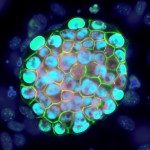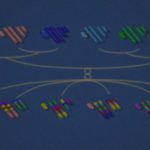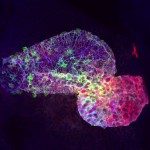Lien vers Pubmed [PMID] – 20861861
Lien vers HAL – pasteur-02552679
Lien DOI – 10.1038/gene.2010.45
Genes and Immunity, 2011, 12 (1), pp.23-30. ⟨10.1038/gene.2010.45⟩
Laboratory mice are well known to be highly susceptible to virulent strains of Yersinia pestis in experimental models of bubonic plague. We have found that Mus spretus-derived SEG/Pas (SEG) mice are exceptionally resistant to virulent CO92 and 6/69 wild type strains. Upon subcutaneous injection of 10(2) colony-forming units (CFU), 90% of females and 68% of males survived, compared with only an 8% survival rate for both male and female C57BL/6 mice. Furthermore, half of the SEG mice survived a challenge of up to 10(7) CFU. The time required for mortality was similar between B6 and SEG, suggesting that survival is dependent on early rather than late processes. The analysis of 322 backcross mice identified three significant quantitative trait loci (QTLs) on chromosomes 3, 4 and 6, with dominant SEG protective alleles. Each QTL increased the survival rate by approximately 20%. The three QTLs function additively, thereby accounting for 67% of the difference between the parental phenotypes. Mice heterozygous for the three QTLs were just as resistant as SEG mice to Y. pestis challenge. The SEG strain therefore offers an invaluable opportunity to unravel mechanisms and underlying genetic factors of resistance against Y. pestis infection.





